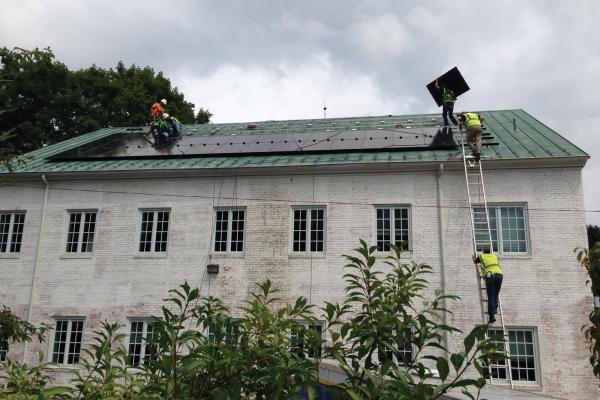JUST A FEW YEARS AGO, Dan Conant was living a life familiar to generations of West Virginians. Born and raised in the state’s Eastern Panhandle, he’d gone to college and left West Virginia to build a career for himself.
But Conant, who was working on community solar panel projects in Vermont, couldn’t shake the feeling that he was needed back home, where the shuttering of the coal industry threatened the few employment opportunities that remained.
“It was almost too easy in Vermont,” he recalled. “I needed to be back in West Virginia.”
In 2013, he and his wife, Laura Nagel, a Pittsburgh native, returned to Jefferson County and “Solar Holler,” a crowd-funded venture that installs solar panels for no cost at nonprofits, was born.
“Free, local electricity allows [nonprofits] to put resources toward what matters—including taking care of our neighbors—and creation,” the organization explains on its website.
Solar Holler’s unique crowd-funding model is designed to function within the restrictions of West Virginia’s power industry legislation that, unsurprisingly, favors coal. Nationally, the solar industry relies on tax credits, for which nonprofits in West Virginia are ineligible. Solar Holler’s early efforts to circumvent this barrier—by selling solar panels directly to a church—were shut down by state lawmakers.
Then Conant contacted Mosaic Power, a Maryland-based company that uses special meters to regulate power usage on water heaters. Under the current model, a nonprofit contacts Solar Holler about getting panels installed and has its electricity needs assessed. Then, the nonprofit’s supporters volunteer to have the Mosaic smart meters placed on their own personal water heaters. Mosaic then passes the energy savings on to the local power plant and gives each participant a $100 credit for allowing the use of their water heater. (It takes about 75 water heaters to fund a solar project.) The volunteers then give their rebate to Solar Holler, and the collected money is used to install a solar array on the nonprofit. It’s complicated, but it works.
So far, Solar Holler has completely funded and installed two solar arrays, one at a library in Harper’s Ferry and the other at Shepherdstown Presbyterian Church. Many more projects are in the works across the state. Crowd-funded, low-cost energy is particularly appealing and suitable for congregations.
“We’ve had dozens of churches coming to us,” Conant explained.
Than Hitt, a member of Shepherdstown Presbyterian who led the congregation’s partnership with Solar Holler, explained why renewable energy is the right fit for his church. “Shepherdstown Presbyterian is about caring for creation,” he said. “People understand very clearly that it is a requirement that we act.”
The church’s solar panels have worked without a hitch since they were installed in 2014, and the low-cost, clean energy has been a boon to the church’s mission. But, Hitt adds, Solar Holler has helped the congregation do more than protect the creation entrusted to them. Funding the project, one water heater at a time, has connected the church to the larger community.
“We have gotten physical energy from this project and metaphysical energy from this project,” Hitt said. “With the water heaters, people are part of a team. … We’re connected to the world much more intensely.”
BUILDING ON THESE successes, Conant and the Solar Holler team have taken their efforts across the state. They recently announced a partnership with the Coalfields Development Corporation, a community-based organization that provides affordable homes, creates jobs, and generates economic opportunities for low-income families in southern West Virginia, to retrain and employ former coal miners on projects in Huntington and Wayne County. Conant calls the efforts “job training and wealth building.”
The decline of coal has been a blow to the Mountain State, but Conant believes West Virginians are uniquely situated to take advantage of the possibilities provided by renewable energy. “West Virginia is a very libertarian state. Solar is a way to take care of yourself. Control your own power, control your own destiny,” he said.
“This year, solar will make up half the energy in the world,” said Conant. Solar Holler’s mission is to address the challenges his fellow citizens face as they seek to make a living in the mountains they’ve called home for generations.
“We want to make sure the folks who built this country and made it what it is don’t get left behind.”

Got something to say about what you're reading? We value your feedback!

